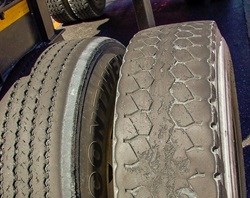More than 70% of the 24 trucks tested in Pietermaritzburg on Friday, 22 November 2013 were deemed unroadworthy and were suspended. What does that say about the safety of heavy vehicles on South African roads?
According to Willies Mchunu, KwaZulu Natal Transport MEC, Road Traffic Inspectorate officers carried out an operation on Friday, 22 November 2013 that resulted in the testing of 24 trucks, suspension of 17 trucks and the issuing of 28 warrants. This clearly highlights the state of the majority of heavy vehicles on our roads and the need for improved safety.
The condition of truck tyres will directly affect the steering, braking and overall handling and control of the vehicle, which makes it a key concern and focus area when tackling heavy vehicle safety.
The Department of Transport reports that up to 53% of vehicle component failure accidents are caused by tyre failure.
"As tyres are the only parts of a vehicle that are in contact with the road's surface, it plays a critical role in road safety," says Dr Etienne Human, South African Tyre Manufacturer's Conference (SATMC) CEO and Director.
"This is especially true for truck tyres that have to support not only the massive weight of the vehicle but also the load it is carrying and deal with road surfaces and other congested traffic."
Contributing factor to road accidents
It is a proven fact that tyre failure is a major contributing factor to thousands of road accidents and deaths every year. The use of second-hand tyres is considered one of the biggest culprits. Worn or damaged tyres that are discarded are collected, patched or regrooved and resold by unscrupulous traders often with fatal results.
Buying from reputable dealers will ensure the quality and safety of your tyres.
Companies that operate a fleet of trucks and other heavy duty vehicles have a legal and moral responsibility to ensure their fleet adheres to safety regulations. Truck owners must allow for tyre and truck suspension checks and not just force truck drivers to "keep the driver's seat hot". Drivers often say their owners force them to continue driving although they have reported a faulty tyre!
SATMC encourages truck owners, drivers and users to habitually check their tyres:
- Do weekly checks to ensure that the tyres are inflated correctly, according to the vehicle manufacturer's guidelines. All pressure gauges and compressor equipment should also be checked for accuracy at regular intervals. The inner tyre of a dual fitment also has to be checked and not simply ignored. On many trucks these are never checked.
- It is recommended that tyres are removed from the truck when the tread reaches a minimum of 3mm. Good tread significantly improves braking. Trucks carrying heavy loads take longer to slow down. Although modern vehicles are equipped with improved braking systems, such as ABS (anti-lock braking systems) and engine retarding systems, the tread on tyres is what ultimately determines how quickly a vehicle comes to a stop. Brakes slow down the rotation of wheels, but it is the grip between the tyres and the road surface that determines how quickly it will come to a stop, especially in wet weather.
- Switch to nitrogen-filled tyres. Nitrogen-inflated tyres have more benefits than compressed-air tyres. They lose pressure more slowly, last longer and most importantly are cooler-running. A cooler tyre reduces heat build-up and reduces tyre fires and brake failure. The brakes on trucks generate huge amounts of heat which is transferred to the tyres.
- Use the correct tyre selection and fitting procedures. Fitting the correct size tyre that is compatible with the rim and dual fitment is crucial to tyre safety. Incorrect fitting is not only dangerous to the personnel who fit the tyre as it could explode when inflated, but also hazardous when the truck is on the road. The same brand, model and size of tyre must be fitted on an axle and especially dual fitments.
- When repairing tyres always follow the manufacturer's guidelines as to the repair limit of a tyre. When patching a tyre, follow the repair material manufacturer's instructions as they are constantly updating methods when tyre patches are developed and changed. Do not force a repair shop to repair a tyre if they warn you that it should not be repaired but rather replaced with a new or good retreaded tyre.
- Do not overload a truck as the truck and roads are damaged and accidents occur as a result.
- Finally carry out daily visual inspections of the tyres looking for bulges and cuts in the sidewalls or sharp objects such as nails or glass stuck in the tyre. Ensure that parts of the truck body are not touching the tyres.
The standard and maintenance of your tyres is possibly one of the most important aspects of your fleet's safety. Frequently maintaining and replacing tyres can save your company time and money, avoid increased insurance costs and save lives. Truck owners also have a responsibility towards the public's safety to keep deaths and injuries off the road.






















